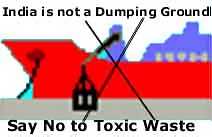Mercury
is an extremely powerful neurotoxin that has already contaminated
waterways throughout the United States, posing widespread dangers
to the population, particularly pregnant women and children.
Now,
a US company is attempting to ship 118 tons of used mercury from
a failed HoltraChem chlor-alkali factory in Maine to India. They
refuse to disclose the final destination or purpose of the mercury.
This will pose a grave threat in India, where regulations and safeguards
for handling mercury are virtually non-existent.
The
US government has already established a National Defense Stockpile
to store mercury when essential to protect the public health. Now
we need to convince the Defense Department to accept the HoltraChem
mercury into this stockpile.
To
sign on to the following letter, please send your name and complete
address to action@essential.org
Neil
Tangri
J.S.Gansler
The
Under Secretary of Defense
3010
Defense Pentagon
Washington,
DC 20301-3010
We
are writing to strongly urge the Department of Defense (DoD) to
allow commercial quantities of mercury, including the 260,000 pounds
of mercury from the closed HoltraChem plant in Maine, to be stored
at the National Defense Stockpile. Allowing additional quantities
of mercury from facilities like HoltraChem to be sold and haphardly
released--rather than stockpiled for retirement-- presents an imminent
danger that DoD has a moral obligation and is empowered under current
Federal law to prevent.
As
you indicated in a recent letter to Maine Governor Angus King, current
Federal statute, U.S.C. 2692, permits the DoD to store toxic or
hazardous material not owned by DoD when essential to protect the
public from imminent danger. At this time, there is more than sufficient
evidence that clearly demonstrates the dangers of mercury sales
and subsequent releases on human populations. This includes the
release of the December 1997 Mercury Study Report to Congress and
the congressionally-mandated July 2000 report by the National Research
Council, entitled "Toxicological Effects of Methylmercury," which
states:
"Hg
is pervasive and persistent in the environment. Its use in products
and emission from industrial processes and combustion have resulted
in global circulation and atmospheric deposition. There have been
well-documented instances of population poisonings, highly exposed
occupational groups, and worldwide chronic low-level environmental
exposures. The bioaccumulation of MeHg can lead to high concentrations
in many species of fish and result in unacceptable levels of exposure
and risk to highly exposed or susceptible subpopulations ... The
committee estimates that over 60,000 children are born each year
at risk for adverse neurodevelopmental effects due to in utero exposure
to MeHg."
As
awareness of the dangers of mercury grow, a number of actions are
being taken across the United States to stop sales and releases
of mercury. Many US cities, states and hospitals, including Boston,
San Francisco, and New Hampshire, are phasing out mercury thermometers
as a first step towards eliminating the possibility of mercury leaking
into the environment. In the northeastern US, state and Federal
environmental officials have attempted to negotiate the purchase
of the HoltraChem mercury-- provided that DoD allows its storage
at the National Defense Stockpile. In addition to adopting a resolution
in September in support of stockpiling large quantities of mercury,
the New England governors had earlier written a letter to President
Clinton in support of developing "strategies for the interim storage
of mercury until more permanent long term options can be implemented."
Over
the past five to ten years, mercury use in developed countries has
declined dramatically. In developing countries, however, mercury
is still used widely in the manufacture of consumer products, like
thermometers, as well as in chlorine production where regulations
are often lax or nonexistent. So, even as we phase out this extremely
persistent toxic metal from our products and lives in the United
States, we shamelessly export it to industrializing countries knowing
full well the magnitude of dangers to human lives and environment
can cause in these countries and in the US when the mercury comes
back in products or rains down upon us from the global pool.
Recovered
mercury should be considered a liability and set aside as a dangerous
waste--and not masked as a commodity and sold to unsuspecting third
world countries like India. Clearly, DoD can and should fulfill
its statutory mandate by recognizing the dangers presented both
in the US and abroad by the sale of commercial quantities of mercury,
like the HoltraChem mercury, to third world countries. Instead,
commercial quantities of mercury should be allowed stored on an
interim basis at the National Defense Stockpile until a permanent
retirement solution can be found.

![]()


 Dear
Friends,
Dear
Friends, 






